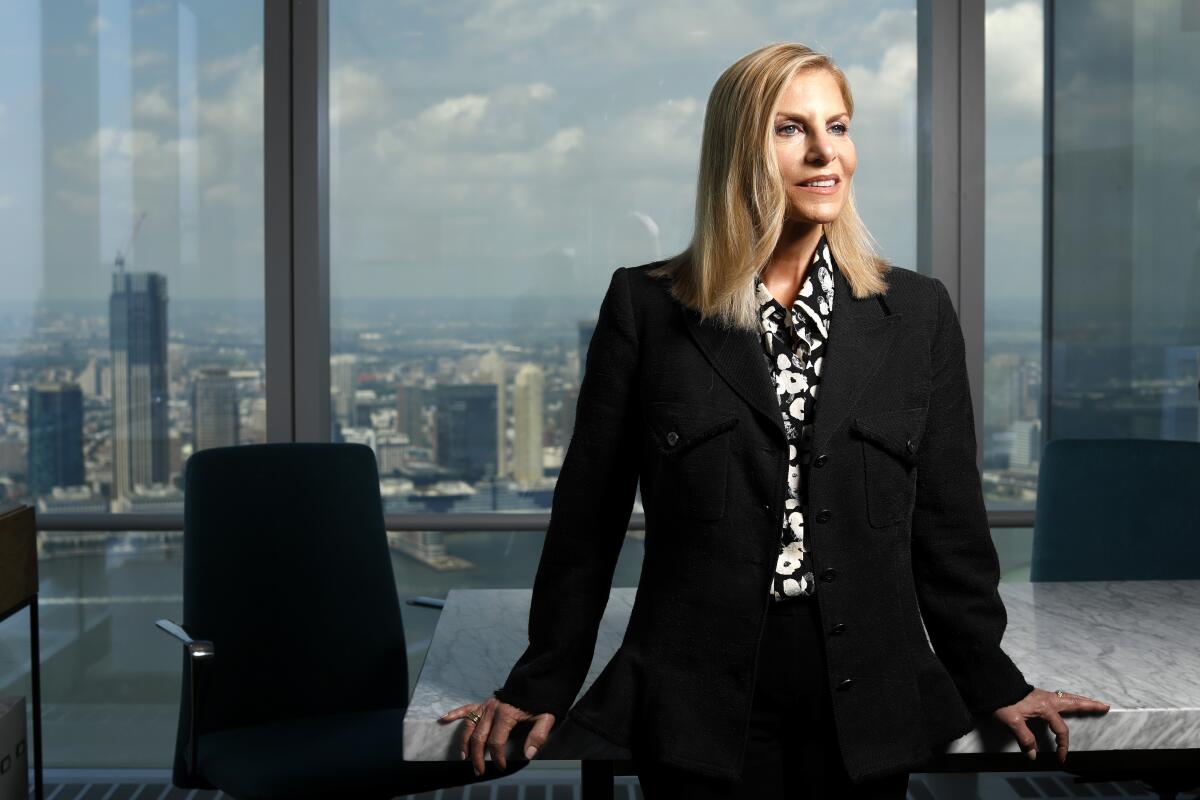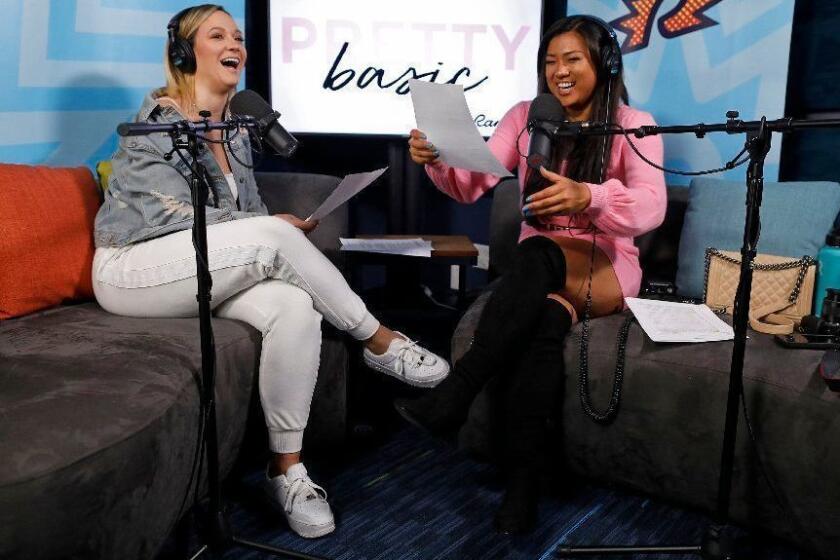Dawn Ostroff’s plan to turn Spotify into the ultimate podcast hub

- Share via
San Francisco — When Dawn Ostroff began working the graveyard shift at a Miami radio station, her parents assumed her career in radio would be short-lived. The college student was awkward reading the news, but she honed her skills and kept her job. Four decades later, Ostroff is transforming the next generation of radio for the world’s largest music-streaming subscription company.
Since she was tapped as Spotify’s chief content officer about a year ago, Ostroff has been charged with building an arsenal of podcasts to catapult the Swedish business to become a leader not just in music but also audio storytelling. Under her watch, the number of podcasts available on Spotify has grown to more than 450,000 titles, up from 185,000 in February.
The company, with offices in New York and L.A., has earmarked up to $500 million this year to buy podcast-related businesses, and already Ostroff has snapped up podcast studios including New York-based Gimlet Media and L.A.-based Parcast to create exclusive content for Spotify. Next year, Ostroff says the plan is to have “hundreds and hundreds” of new original podcast series in production or available on the platform.
“Becoming the most listened to audio network means that we needed to expand from just being a music platform to incorporating other types of audio, entertainment and information on the platform,” Ostroff said in an interview from Sweden. “Podcasts have started to really take off.”
Spotify has 232-million monthly active users and nearly half are subscribers with regular subscriptions at $9.99 a month. Already, tens of millions of people listen to podcasts on Spotify, the company said. Popular podcasts include Spotify exclusives such as the music and pop culture series “The Joe Budden Podcast” and German-language comedy show “Fest & Flauschig,” as well as other series that are not exclusive to Spotify, such as the true-crime comedy show “My Favorite Murder.”
Why the push? Ostroff believes podcasts can attract new listeners and increase the amount of time people spend on the platform. Audio stories can be accessed on multiple devices while consumers are multitasking.
“There is a dramatic expansion in the amount of time where you’re capable of ingesting audio,” said media and tech analyst Rich Greenfield. “If you’re Spotify, why would you want to limit yourself just to music?”.
Podcast app listening on mobile devices is up 60%, and millennials are driving the growth, with one-third consuming at least five podcasts a week.
Podcasts are especially popular with millennials, people ages 25 to 34, with one-third of the podcast listeners in that age group consuming at least five podcasts a week, according to research from Adobe Analytics. Spotify expects that eventually roughly 20% of listening on its platform will be non-music.
“My motto has always been to follow young people and understand why they are going in a certain direction,” said Ostroff, 59, who is based in New York City and oversees a team of about 1,000 people.
But Spotify has significant competition from Apple, which has offered podcasts on its platform since 2005. Many discover podcasts through Apple’s Podcasts app, which supplies more than 750,000 podcast shows. Apple doesn’t charge a subscription for its app and has yet to launch its own exclusive, original productions in podcasts, although Ostroff is aware of the rumors.
Apple also competes with Spotify through Apple Music, which has more than 60 million people who use the service worldwide.
Other competitors include rival Pandora and venture capital-backed startups like Luminary that have also created their own libraries of exclusive content.
Greenfield says Spotify must ensure that its users have the best experience finding and listening to podcasts, and supply shows that can’t be found elsewhere.
“They have to find content so good that you switch over,” Greenfield said.
Ostroff recognizes the challenge in what has become a global business. Spotify, which is in 79 markets worldwide, has been rolling out original and exclusive podcasts in countries like Germany, Brazil, Mexico and Sweden. The company will support its podcast spending by having ads on the programs.
“It’s about how do we get big hits on the platform in the U.S. and around the world and create content that’s going to really resonate,” Ostroff said.
Ostroff was raised in New York City. Her dad worked as a concert promoter and her mom owned a baby items store. She launched her career in Miami while attending college there and working at WINZ radio station. Despite early struggles, Ostroff persisted and became a broadcast journalist, covering local news stories. But reporting wasn’t for her.
“News was really a very hard way to make a living and to spend every day covering stories that were so impactful to the world and having the responsibility of needing to be the communicator of what those stories are and the pressure felt intense and overwhelming,” Ostroff said. “I eventually moved to L.A. and started to work in entertainment where I laughed a lot and I didn’t have that same sense of responsibility, but I did really enjoy the creativity and the ability to tell stories.”
Ostroff rose up the ranks in Hollywood, working at companies including Disney, Fox, Lifetime, UPN and the CW network. She led Lifetime Entertainment from 1996 to 2002, when it became a top-rated cable network.
As president of the UPN Network from 2002 to 2006, Ostroff developed hit shows such as “America’s Next Top Model,” a reality series initially presented by supermodel Tyra Banks that has run for 24 seasons.
At the CW, Ostroff helped the company target young audiences when illegal downloading of shows on the Internet was rampant.
“It was the exact moment when young audiences were starting to migrate to digital platforms,” said Dana Walden, chairman of Disney Television Studios & ABC Entertainment, who is Ostroff’s friend and former co-worker at Fox. “There are a lot of programmers and executives at that point who would have bailed on that strategy.”
But Ostroff leaned into moving shows online and across other platforms. She decided to make episodes of the teen-drama series “Gossip Girl” available on iTunes before they aired on the CW’s TV channel.
“We were able to kind of dispel a lot of myths,” Ostroff said. “We had to because we had nothing to lose.”
Walden believes Ostroff’s bets played a key role in the CW network landing a lucrative deal in 2011 to distribute its shows on Netflix, which made the CW network profitable. Netflix was estimated to have paid approximately $600,000 per “Gossip Girl” episode.
“It was 100% the result of her commitment to programming for young audiences and offering a genuine alternative to what those viewers were getting on traditional broadcast platforms,” Walden said.
After the CW, Ostroff became president at Condé Nast Entertainment in 2011, where she built the company’s digital video business and oversaw its film and TV operations. The digital video unit produced more than 5,000 videos per year and drove more than 1 billion views each month. She took IP from Condé Nast’s publications to create TV shows and movies even as the publishing company struggled in other areas.
After speaking to Spotify’s staff about her work at Condé Nast, the company’s co-founder and CEO Daniel Ek asked to meet with her. He shared his plans to make Spotify the world’s largest audio platform and offered her a job. “It became a very interesting proposition,” Ostroff said.
She joined Spotify in August of 2018 and hit the ground running. Although she oversees content partnerships in music and video, growing podcasting has been a top priority.
Spotify is growing its library by producing original podcasts, landing exclusives and making it easier for podcast production companies to upload programs to the platform.
Earlier this year, Ostroff was instrumental in landing key acquisitions, including Gimlet Media and Parcast, which have produced popular series including the thriller “Homecoming,” which was made into an Amazon show starring Julia Roberts.
“This is a bold move to get in the game,” said Greenfield, who is also an investor in independent podcast production company Wondery. “It signals to the entire podcast world that they are serious.”
Gimlet executives believed joining Spotify would allow them to gather more data on listeners and make it easier for consumers to discover their podcasts, said Matt Lieber, Gimlet’s co-founder and managing director.
Today, Gimlet is working on new productions, including investigative stories and fictional works. A 2018 podcast called “Sandra,” which is about the world of digital assistants and featured Kristen Wiig’s voice in the English version, will be reimagined for German, Portuguese and Spanish audiences.
Lieber said Spotify and Ostroff have given Gimlet the runway to pursue ambitious projects.
“Her message to us was very clear at that time and has remained the same — ‘I want to give you creative freedom to keep doing what you are doing [and] give you the resources to do it on a larger stage and essentially stay out of your way,’” Lieber said.
Ostroff said she’s looking for content that is “really going to be loud” so it brings in the largest amount of users to sign up and spend more time listening to it.
“The amount of content that we can make is endless,” Ostroff said. “Seeing how many of the existing talent in the Hollywood community and the news community are interested in migrating toward this new medium, it really makes it a lot easier.”
There will be tie-ins to the music side of the business. Spotify already has podcasts that delve into music history, such as, “Stay Free: The Story of The Clash,” that was released in earlier this year and explained the story behind the punk rock band. She’s also talked to musical artists who have never done a podcast before.
“If you think about it, it’s another way for artists to connect with their fans, but connect with them in a way that they may have not seen before,” Ostroff said.
Ostroff scored a coup when Barack and Michelle Obama’s production company, Higher Ground, said it would make podcasts for Spotify.
An attorney representing the Obamas approached Ostroff to chat about audio storytelling and seemed intrigued by the idea of connecting Spotify users with music and podcast creators, she said.
“I thought it was a little bit of an opening and it seemed as if there was some interest there,” she said. “Our company mission really resonates with people who wind up in business with us.”
These days, Ostroff is so busy she often wears a set of earphones that magnetically connect around her neck, a way for her to easily make calls or sample podcasts while she’s at work or at the gym.
But sometimes Ostroff takes 15 minutes out of her morning to meditate.
“Speed is a way of life, particularly at Spotify and everywhere these days,” Ostroff said. “It’s always helpful to have that quiet time to have your thoughts before the rest of the world gets loud and noisy.”
More to Read
Inside the business of entertainment
The Wide Shot brings you news, analysis and insights on everything from streaming wars to production — and what it all means for the future.
You may occasionally receive promotional content from the Los Angeles Times.












